
Compilation Album
95 Million People's Popular Request (OR 7071)
(Update: 6th. March 2020)



| TITLE | 95 Million
People's Popular Request |
||||
| CATALOG NUMBER | OR 7071 |
||||
| RELEASE DATE | 15th November. 1964 / First Press? | ||||
| TRACK LISTING | SIDE 1 | SIDE 2 | |||
| Twist And Shout (The Beatles) |
Please Mister Postman (The
Beatles) |
||||
| From Russia With
Love (Matt Monro) |
Movin' (The
Finders) |
||||
| Whare Have All
The Flowers Gone (The Chart Busters) |
White On White
(Danny Williams) |
||||
| La Novia (Gloria Lasso) |
Una Lacrima Sul Viso (Frank Pourcel at son Grand Orchestra) | ||||
| A World Without Love (Peter And Gordon) |
The House Of The Rising Sun (The Animals) |
||||
| Poetry In Motion (Richard Allan) |
Because (The Dave Clark Five) |
||||
| Non Ho L'eta (Frank Pourcel at son Grand Orchestra) | Constantly (Cliff Richard) |
||||
| J'entends
Siffler Le Train (Maxim Saury at son Orchestra) |
|||||
| FRONT --> Click! | BACK --> Click! | SIDE 1 --> Click! | SIDE 2 --> Click! | DISK | |
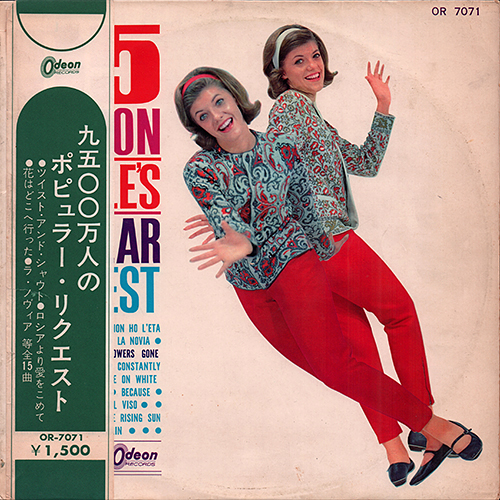 |
 |
 |
 |
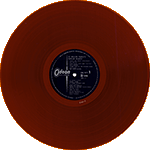 |
|
| INNER SLEEVE |
LYRIC SHEET (Slip Sheet Type) |
||||
| FRONT --> Click! | BACK --> Click! | The original plain white inner bag has a
fold-over flap at the top of the bag to prevent the record
from falling out. |
FRONT --> Click! | BACK --> Click! | |
 |
 |
 |
 |
||
| LYRIC
SHEET CLOSE UP |
|||||
 |
 |
Catalog number
"OR 7071" and "Toshiba Musical Industries Ltd." were printed
on the lyric sheet. |
|||
| LYRIC SHEET CLOSE UP | |||||
 |
"Kanebo
Cosmetics" ad was printed at the bottom of the lyric sheet. |
||||
| FRONT COVER CLOSE UP | BACK COVER CLOSE UP | ||||
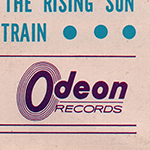 |
 |
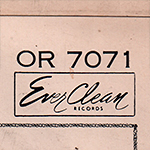 |
Toshiba pressed a lot of their records on red, “Everclean” vinyl. The Everclean vinyl was designed to be less prone to collecting static electricity and dust than the more common black vinyl. |  |
|
| Odeon logo mark and catalog No. were printed on the front cover. | "F ¥1,500" was printed at the bottom of the back cover. | ||||
| BACK COVER CLOSE UP | |||||
 |
This record contains two songs "Twist And
Shout (side-1)" and "Please Mr. Postman (side-2)"
performanced by The Beatles. |
||||
 |
|||||
| BACK COVER CLOSE UP | |||||
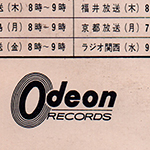 |
Odeon logo mark was printed at the lower left corner of the front sleeve. | 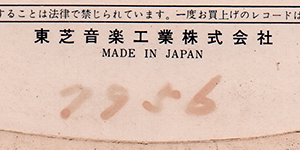 |
Single type. Full
laminated soft cover. Twin-flipback cover (round type). "Toshiba Musical Industries Ltd." was printed at the bottom of the back cover. |
||
| OBI:
DARK GREEN OBI |
|||||
| FRONT TOP |
FRONT BOTTOM |
It
is dark green / white in design with dark green background
with the half circle on top. It also features an Odeon logo,
catalogue number and price information. |
BACK |
There
is no order sheet
on the back side of the Obi. "Toshiba Musical Industries Ltd." was printed on the strip. |
|
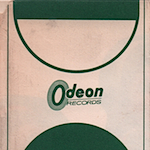 |
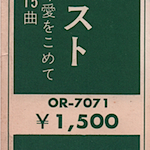 |
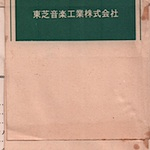 |
|||
| LABEL CLOSE UP | |||||
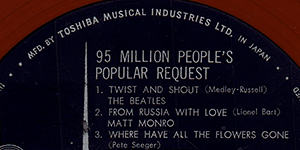 |
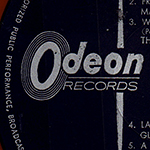 |
Toshiba
pressed a lot of their records on red, "Everclean" vinyl
from 1958 through 1974 (maybe). The Everclean vinyl
was designed to be less prone to collecting static
electricity and dust than the more common black vinyl. The
words "MFD. BY TOSHIBA MUSICAL INDUSTRIES LTD. IN JAPAN" was
printed at the perimeter. |
|||
| LABEL CLOSE UP |
|||||
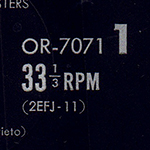 |
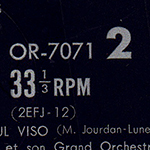 |
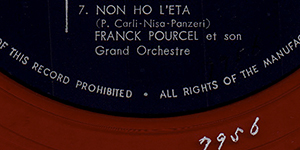 |
Catalog number and matrix
number were printed at the right side of the center hole. The words "LONG PLAYING" was NOT printed at the bottom of the label. |
||
| LABEL CLOSE UP | |||||
| SIDE 1 |
SIDE 2 |
This record contains two songs "Twist And Shout" and "Please Mr. Postman" performanced by The Beatles. | |||
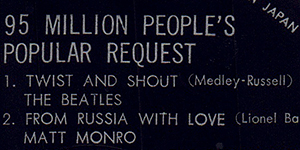 |
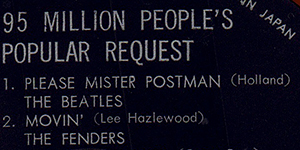 |
||||
|
OTHER ITEM
|
|||||
| - |
|||||
| RECORD LABEL | Odeon Label Type-2 (without the words "LONG PLAYING") | ||||
| MIX | STEREO |
||||
| MATRIX No. | SIDE 1 | 2EFJ-11 11 |
|||
| SIDE 2 | 2EFJ-12 7 |
||||
| PRESS MARK |
K4 |
||||
| VINYL COLOR | RED | ||||
| RECORD COMPANY'S NAME | SLEEVE |
Toshiba Ongaku
kogyo Kabusikigaisha |
|||
| LABEL |
MFD. BY TOSHIBA MUSICAL INDUSTRIES
LTD. IN JAPAN |
||||
| SYMBOL/PRICE | F ¥1,500 |
||||
| LYRIC SHEET STYLE | Slip Sheet Type |
||||
| COVER FORM | Single type. Full laminated soft cover. Twin-flipback cover (round type) |
||||
| INNER SLEEVE |
The original colour "advert" inner bag
Type-3 |
||||
| OBI | Dark
green Obi / without Order sheet |
||||
| COVER DESIGN/ PHOTO/ NOTES | Liner notes: Sadao Kaneko |
||||
|
COMMENTS
|
Black Odeon label with
silver print. The words "LONG PLAYING" was NOT printed at the bottom of the label. "95 Million Popular Requests" was a radio program broadcasting a hit parade throughout Japan. This program began broadcasting in April 1963, and is hosted by Masao Kojima. With "Nippon Cultural Broadcasting Inc." in Tokyo as a key station, it has a network of 34 private broadcasters from Hokkaido to Okinawa, for a total of 111 stations. This is a compilation album of the radio program of "95 Million Popular Requests". This record contains two songs "Twist And Shout (side-1)" and "Please Mr. Postman (side-2)" performanced by The Beatles. Red vinyl: Besides good sound and quality printing, Japanese records also offered some other things of interest to the collector. One of the primary manufacturing companies in Japan, Toshiba, pressed a lot of their records on red, “Everclean” vinyl from 1958 through 1974 (maybe). While not pressed as collectors’ items, these red vinyl pressings are more sought out by collectors than their black vinyl counterparts. The Everclean vinyl was designed to be less prone to collecting static electricity and dust than the more common black vinyl. The obi: "Dark green" Obi It is light dark green / white in design with light blue Japanese text. It also features an Odeon logo, catalogue number and price information. While most Japanese records feature local music, a lot of music fans there like foreign music, as well. The language barrier in Japan presented a problem – should foreign album covers be changed for Japanese albums? The solution was the obi, which means “belt” or “sash”. The obi is a strip of paper, usually about two inches wide, that wraps vertically around the album cover, containing information about the artist and album in Japanese. As these strips of paper were fragile and easily torn, they are often missing, especially since consumers in the 1950s and 1960s attached little significance to them. Finding Japanese records made prior to 1970 that still have the obi intact can be quite difficult, and for some albums, nearly impossible. The inclusion of the obi can dramatically affect the price of some Japanese records, sometimes increasing the price by a factor of ten. |
||||
